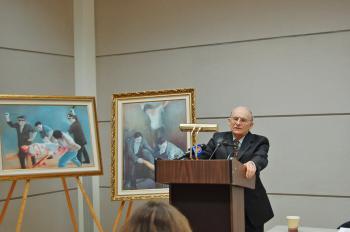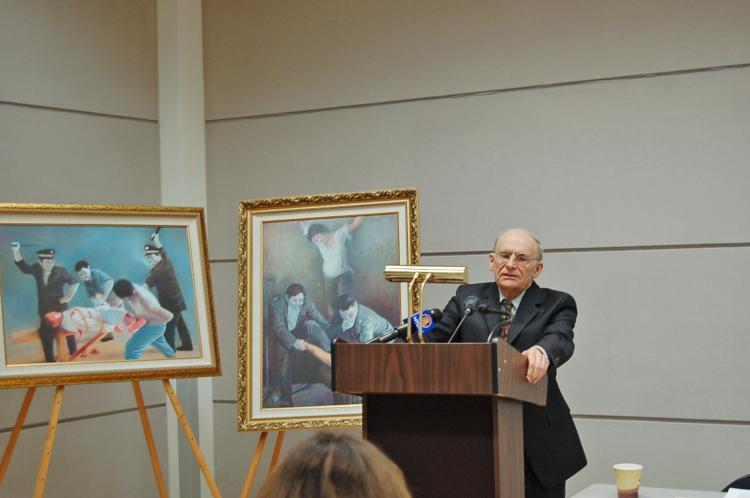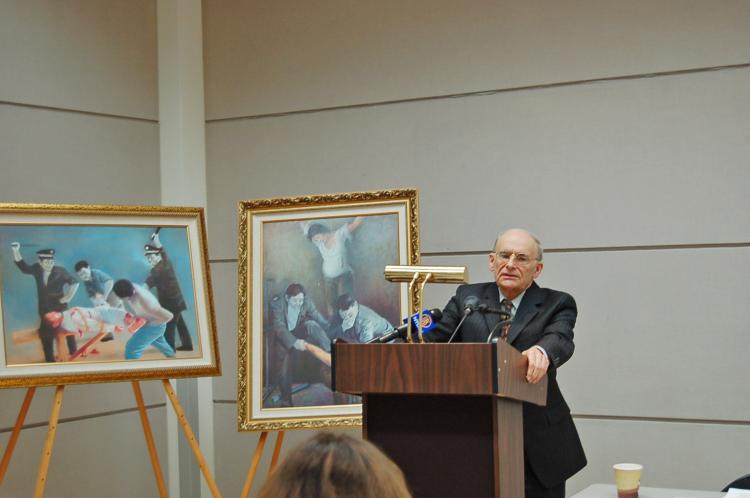VANCOUVER, Canada—On a serene evening in Vancouver, a full house of about 70 came to Vancouver Public Library for Nobel Peace Prize nominee David Matas’ book tour. Matas spoke about the research that led to the discovery of live organ harvesting of Falun Gong practitioners.
The research process wasn’t an easy one. Although many are aware that the persecution of Falun Gong practitioners in China began in 1999, no one knew for sure if organ harvesting as method of persecution was actually used.
“The very basis of the story was difficult to assess one way or the other,” said Matas, senior legal counsel for B’nai Brith Canada and a member of the Order of Canada.
“Because what we were told was that the victims were killed and the bodies were cremated … There wouldn’t be any records in the Chinese hospital record—it wouldn’t be available to us or any researcher. The scene of the crime and the operating room in the hospital is cleaned up after operation, so there’s no crime scene.”
Although they didn’t want to believe in the “worst of humanity,” as Matas put it, Matas and his partner David Kilgour, former Canadian cabinet minister and crown prosecutor, in 2001 they started their independent research as volunteers in their free time in case the organ harvesting was truly happening on the other side of the globe.
Among their many research methods, they had callers calling hospitals across China pretending to be relatives of patients needing organ transplants.
“We got hang ups and we got rejections,” said Matas, but some hospitals did admit that they had organs of Falun Gong practitioners for sale.
Another piece of evidence was blood testing of imprisoned Falun Gong practitioners.
“Obviously we didn’t interview anybody who had their organs taken,” said Matas. “But we were interviewing people who got out of prison and what they told us was that Falun Gong practitioners in prison were being systematically blood tested and had their organs examined and the non-Falun Gong practitioners were not. We heard this from both Falun Gong practitioners and non-Falun Gong practitioners.”
Statistically, China is the world’s leading transplant center after the United States in terms of volume. Yet there was no donation system until last year.
“The unofficial, which later became the official explanation was that organs were coming from prisoners sent to death,” he said.
However, the number of execution in China according to Amnesty International is far below the number of transplants—10,000 annually according to Matas. Even after the Chinese government changed its death penalty system, making death penalty less likely, the number of transplants remained steady.
After publishing several comprehensive reports in previous years, Matas said that their new book, “Bloody Harvest,” includes updates since 2006 in addition to the content of the original reports.
“The whole environment has changed, so we have to deal with the new environment,” said Matas.
Since the publishing of their first report, Matas and Kilgour have been invited to 80 cities in 40 countries to present their research, while accumulating more evidence on the way.
“People across the world in academic institutions as well as community, student [bodies], human rights organizations would be outraged to hear this,” said audience member Edward, who recently moved from Texas to study in Vancouver. “This is something primarily upsetting to any human being with any sense of connectivity to other people at all. … The question is how to get the word out and make awareness of this.”
Another audience member, Jim, is a semi-retired researcher and teacher who originally came from China.
“I’m not as shocked as other people, because I’m politically aware … and because I lived in China for so many years,” said Jim. “Even some renowned Chinese figures in Vancouver, they still think half-half, that CCP did something good for China, but I think they are deceived. … The Chinese Communist Party has been [spreading propaganda] for so many years.”
“
Bloody Harvest” is available for $19.95 on Amazon.com.
The research process wasn’t an easy one. Although many are aware that the persecution of Falun Gong practitioners in China began in 1999, no one knew for sure if organ harvesting as method of persecution was actually used.
“The very basis of the story was difficult to assess one way or the other,” said Matas, senior legal counsel for B’nai Brith Canada and a member of the Order of Canada.
“Because what we were told was that the victims were killed and the bodies were cremated … There wouldn’t be any records in the Chinese hospital record—it wouldn’t be available to us or any researcher. The scene of the crime and the operating room in the hospital is cleaned up after operation, so there’s no crime scene.”
Although they didn’t want to believe in the “worst of humanity,” as Matas put it, Matas and his partner David Kilgour, former Canadian cabinet minister and crown prosecutor, in 2001 they started their independent research as volunteers in their free time in case the organ harvesting was truly happening on the other side of the globe.
Among their many research methods, they had callers calling hospitals across China pretending to be relatives of patients needing organ transplants.
“We got hang ups and we got rejections,” said Matas, but some hospitals did admit that they had organs of Falun Gong practitioners for sale.
Another piece of evidence was blood testing of imprisoned Falun Gong practitioners.
“Obviously we didn’t interview anybody who had their organs taken,” said Matas. “But we were interviewing people who got out of prison and what they told us was that Falun Gong practitioners in prison were being systematically blood tested and had their organs examined and the non-Falun Gong practitioners were not. We heard this from both Falun Gong practitioners and non-Falun Gong practitioners.”
Statistically, China is the world’s leading transplant center after the United States in terms of volume. Yet there was no donation system until last year.
“The unofficial, which later became the official explanation was that organs were coming from prisoners sent to death,” he said.
However, the number of execution in China according to Amnesty International is far below the number of transplants—10,000 annually according to Matas. Even after the Chinese government changed its death penalty system, making death penalty less likely, the number of transplants remained steady.
After publishing several comprehensive reports in previous years, Matas said that their new book, “Bloody Harvest,” includes updates since 2006 in addition to the content of the original reports.
“The whole environment has changed, so we have to deal with the new environment,” said Matas.
Since the publishing of their first report, Matas and Kilgour have been invited to 80 cities in 40 countries to present their research, while accumulating more evidence on the way.
“People across the world in academic institutions as well as community, student [bodies], human rights organizations would be outraged to hear this,” said audience member Edward, who recently moved from Texas to study in Vancouver. “This is something primarily upsetting to any human being with any sense of connectivity to other people at all. … The question is how to get the word out and make awareness of this.”
Another audience member, Jim, is a semi-retired researcher and teacher who originally came from China.
“I’m not as shocked as other people, because I’m politically aware … and because I lived in China for so many years,” said Jim. “Even some renowned Chinese figures in Vancouver, they still think half-half, that CCP did something good for China, but I think they are deceived. … The Chinese Communist Party has been [spreading propaganda] for so many years.”
“
Bloody Harvest” is available for $19.95 on Amazon.com.






